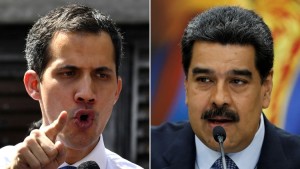Carlos Sánchez Berzaín
March 7, 2019
(Interamerican Institute for Democracy) The people´s fight for their freedom and democracy and the dire need of the agonizing dictatorship from Cuba to continue propping its puppet dictator in Venezuela, offers the new reality in which Juan Guaido is the President of Venezuela with all legitimacy and legality and the de-facto power is exercised by the dictator Nicolas Maduro. Up to now Guaido has been kept from constituting an effective government to take over the internal control of the country, while Maduro clinches on to power through organized crime. Venezuela has a president without a government and a dictator without a country.
In Venezuela, the dictatorship is exhausting its last resources, its playing its last pawns, and is trekking towards its unavoidable end. The question remains, however, as to how long that end will take to arrive and what must be done to speed it up and for it to represent a true change for the reconstruction of a society and a state devastated by the intervention of transnational organized crime.
A government is defined as “the superior institution of the Executive Branch of a State, or of a political community, comprised by the President and the ministers or advisors”. Article 225 of the Constitution of the Bolivarian Republic of Venezuela mandates “the Executive Branch’s duties are performed by the President of the Republic, the Executive Vice President, the Ministers and other officials as determined by this Constitution and the law”.
Right after Juan Guaido had assumed duties as the Interim President, however, Venezuela’s National Assembly approved the so-called “statute to govern the transition back to democracy to reestablish the validity of the Constitution of the Bolivarian Republic of Venezuela” that in its Article 2 states “by saying transition, it is understood to mean the itinerary towards the return to democracy and the re-institutionalization that includes the following phases: liberation from the autocratic regime that oppresses Venezuela, conformation of a provisional government of national unity, and the conduct of free elections”.
Article 7 of this same Transition’s Statute reiterates the three phases of such transition by placing in first place the need for “liberation from the dictatorial regime, which would take place with the end of the de-facto powers that are at the hands of Nicolas Maduro Moros” and then as a second phase “the conformation of a provisional, government of national unity, to ensure the reestablishment of a democratic system and the need to call to free elections”. Article 25 of this same statute states “once the usurpation of the Presidency of the Republic has been stopped . . . the National Assembly’s President (now Guaido) shall hold office during 30 consecutive days as Interim President in charge of the Republic. . .”
The way things are, the National Assembly’s decision is that first the dictator leave and afterwards a Transitional Government be constituted. If this decision is genuine, it is -at the very least- a grave strategic error, because no one doubts that a President without a government does not have the means of internally defeating the Castroist Chavist dictator. There are already many and growing objections that point to the opposition that is “functional to the needs of the dictatorship” or multiple candidates who are jealous of Guaido’s popularity and who would prefer to have him with “his hands tied behind his back” and by doing so they only benefit the dictatorship.
For Venezuelans and for the whole world, Juan Guaido is the Interim President of Venezuela, with over 90% of internal popularity and the recognition of over 60 States, but he is alone, he has no government. It is vital for the National Assembly to allow Juan Guaido to organize a true government with essential Ministries, such as the Ministry of Foreign Affairs, Ministry of Defense, and Ministry of Economy. There is no way to direct international affairs with designated ambassadors but without a Minister of Foreign Affairs. There cannot be any significant changes in the military hierarchy, e.g., removing disobedient or insubordinate military commanders without a Minister of Defense. It is impossible to control national resources without a Minister of Economy.
In a confrontation, such as the one Venezuelan people are enduring, victory is achieved by the aggregate of one’s own correct decisions and the incorrect decisions taken by the enemy. Cuba’s dictatorship and its puppet Nicolas Maduro have made very few correct decisions, but many incorrect ones, but on the side of the leadership for the return to freedom and democracy, to keep from immediately conforming a true government for the real performance of the duties of the presidency by Juan Guaido, is the gravest mistake that keeps from achieving victory for democracy because it has a country – Venezuela- with a President without a Government and a dictator without a country.
*Attorney & Political Scientist. Director of the Interamerican Institute for Democracy.
Published in Spanish by Infobae.com on Sunday, March 3rd, 2019
Translated from Spanish by; Edgar L. Terrazas, member of the American Translators’ Association, ATA # 234680.
 Carlos Sanchez Berzain Abogado | Estadista | Político | Politólogo
Carlos Sanchez Berzain Abogado | Estadista | Político | Politólogo
